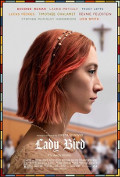
Directed by
Greta Gerwig
94 minutes
Rated M
Reviewed by
Bernard Hemingway

Lady Bird
Synopsis: Christine ‘Lady Bird’ McPherson (Saoirse Ronan) a 17 year living in Sacramento, Californiaand in her final year of high school faces off with her mother (Laurie Metcalf) over her future.
Lady Bird is a neat-enough indie film that astonishingly has received four Oscar nominations including, most extravagantly, Best Picture and Best Director, as well as Best Original Screenplay for director Greta Gerwig’s script and Best Actress for Saoirse Ronan.
Since the fiasco of the all-white Oscars in 2015 the Academy of Motion Picture Arts and Sciences has been madly scrambling to correct the race and gender imbalance in its voting membership and consequent awards results. With the nominations for Lady Bird, the intent is clearly to make itself relevant to younger audiences. If, however, you’ve seen any number of films about the travails of American high school teenage girls, from Amy Heckerling’s Clueless (1995) to Jason Reitman’s Juno (2007) you will be wondering what the fuss is about.
What Lady Bird does bring to the screen that engages us with its emotional insight is its focus on the vexed relationship between the frustrated, impatient titular character and her mother, a loving but humourless and anxious woman who regards Lady Bird’s aspirations to quit parochial Sacramento for college life in New York as unrealistic, particularly financially. The two bicker endlessly with neither giving an inch despite loving each other no less for it.
If Lady Bird doesn’t have Juno’s appealing way with deadpan sarcasm as Gerwig doesn’t have Reitman’s directorial smoothness when the film explores the mother-daughter relationship (probably because it draws on the Gerwig’s own life, not other movies) it is at its best. This is so particularly in the film's latter stages, the final screen encounter between Lady Bird and her mother being beautifully executed.
There is a rather hackneyed line in the film in which Mum tells her daughter that she wants her to be "the best version of herself that she can be". Although Lady Bird responds diffidently "what if this is the best version?" what she should have said is "as long as I'm not like you". In terns of mother-daughter relationships the film makes an interesting comparison to the currently-screening I,Tonya.
The relatively larger part of Lady Bird however rolls out familiar tropes of the high school comedy – the Tracy Turnblad-ish best-friend (Beanie Feldstein), heart-to-hearts with the understanding Dad (Tracy Letts), try-outs with the high school drama club in order to snare the cute boy, the failed attempt to get in with the in-crowd, the unsatisfactory 'first-time' and so on. With respect to the adolescent tribulations of trying to fit in/stand outl Lady Bird is mostly ‘been there, done that’, even if it is packaged with indie charm,
Gerwig is a much admired Indie film actor familiar especially to fans of the much-admired Wes Anderson-Noah Baumbach school of indie film-making (she appeared in the latter’s Mistress America in 2015 and his Greenberg in 2010 and will lend her voice to Anderson's upcomiing Isle of Dogs). Lady Bird is a tidy addition to the sector, albeit probably more so if you are under 30, female and white middle-class American. Oscar material, however, it is not.

Want more about this film?


Want something different?




